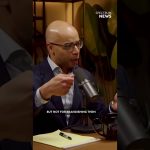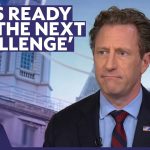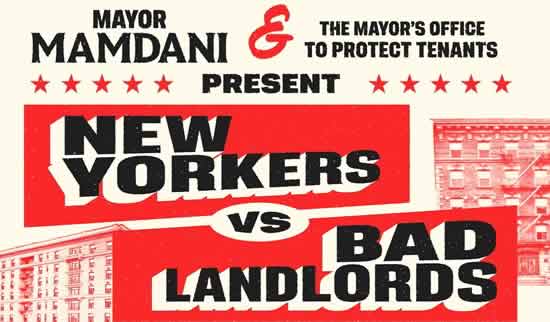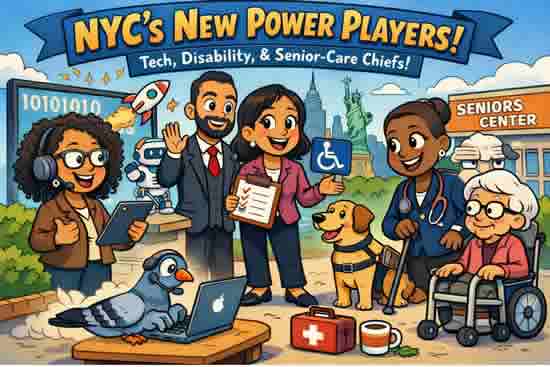J.R. Giddings: Mayor Eric Adams. Is our mayor on yet with us? If not, please bring in our panel. Oh, good morning. Good morning. Good morning, Mr. Mayor. And welcome to the recent talk show. How are you?
Mayor Eric Adams: Quite well, quite well. How are you? Good to see you. Good to be on again.
Giddings: Absolutely. So, Mayor Adams, let’s get right into it, right? Congestion pricing, it’s still a big concern for New Yorkers. Gov. Hoko is moving forward with a 40 percent less charge, dropping the price from $15 to $9 for drivers to pay in New York City. What are your thoughts? The governor had to really listen to New Yorkers in a great deal.
Mayor Adams: A great number of New Yorkers stated that the $15 toll was just far too expensive. And she hit pause, looked at the challenges we’re facing. Many people don’t know, but the money from congestion pricing is going into the MTA capital budget, which is billions and billions of dollars. When you look at throughout the years of the course of this program and the capital budget, it’s the balance that she had to come to the right determination. I think she did just that. I support the governor. The governor has supported the city at an unbelievable rate whenever we needed her.
And so we have we have three challenges when we talk about traffic in Manhattan. Number one, the economic impact. It is hurting business. It’s hurting doing business in the city, attracting people to do business in the city. There are too many cars on the road.
Second is the environmental issue. It is really impacting our environment. And we’re seeing the long term effects of that. And so being able to secure the negotiation, a hundred million dollars to go to those communities that are dealing with environmental and asthma and other environmental problems. We were able to negotiate that in this conversation.
And third, as I stated, the capital dollars that are needed for the MTA, the number of people that use our system and depend on our system that includes our buses and our trains. We needed to find the money to pay for that. And congestion pricing was a way to do so. So she knew she had to find the right balance. And I believe that’s what she attempted to do.
Giddings: Well, Mayor Adams, I know you get the pulse of New Yorkers. What’s the pulse that you’re getting from the New Yorkers, even with the nine dollars reduction?
Mayor Adams: The same pulse we got when we started tolling the bridges. No one was happy. You show me a New Yorker that says, I want to pay a toll or pay a tax. No one is going to raise their hand. But the reality is that tolls and taxes are how we make sure that we run a city of this magnitude. A city that must find ways to pay for the capital, the buildings, our roads, to pay for those low-income New Yorkers that have to live in shelters or that get subsidized care from the city. That’s the complexity of running a city. And none of us want to pay it.
No one wants to say, okay, let me raise my hand and pay to cross the Whitestone Bridge or to cross one of the bridges in our city or go through the tunnel. These items don’t get repaired and built out of magic. They get repaired and built out of taxes and repaired and built out of tolls. Now, the governor could have easily stated, instead of having a congestion pricing toll,
I’m just going to charge every New Yorker an additional $5 daily in their taxes of some sort.
They could have done that, but she said no. And the concept of congestion pricing is those who drive into Manhattan, those who don’t drive in, should not have to pay the cost for those who drive into Manhattan. So that’s running a city. Those are the decisions you have to make. Those are the decisions you have to make. But we are able to pay for the delivery of services for New Yorkers based on taxes and tolls. Those are the only certain ways you can raise revenue and run the city. And those are one of the two ways.
Giddings: Thank you for that, Mayor Adams. Now our next controversial topic is, come year end, the prepaid debit card program for migrants will end, and you will transition back to food delivery services. Can you explain?
Mayor Adams: Well, one it’s not a controversial topic. I think people made it into a controversy. We were continuously trying to find ways of bringing down the cost and stopping food waste. There was a large amount of food waste when we were using other methods, because we were giving people food that they didn’t want to consume.
And so we wanted to bring down food waste. We were able to come up with these food cards. We did a pilot project. We cut down on food waste. We were able to put money back into the local economy. Think about that for a moment. Instead of having a large conglomerate deliver the food, which many people were not consuming that were in the herds and migrant shelters, we were able to let them go to the local supermarkets, the local bodegas, the local stores, and get the food that they were consuming, and we weren’t wasting food.
And so because of our success, we had 220,000 migrants and asylum seekers that went through the system. We put in place a real program, a 30- and 60-day program, telling single adults, 30 days, families with children, 60 days, that you have to start finding your way to not permanently be in our shelter. Because of programs like that and support services, we have been able to drop down the migrant population in our shelters from 220,000 to something like 60-something thousand now. We’re no longer in emergency status.
We now are moving at a different level, and there’s no need for the pilot for the most part, and we’re moving from emergency contracts to having people put in for RFPs, for procurement contracts, and responding to those RFPs. So we’re seeing a successful navigation and transition from a crisis that we were hit with and how we managed it in the city. And hats off to the agency, but also hats off to New Yorkers. New Yorkers stepped up on many levels, and we had to find ways of how do we address that emergency crisis.
Giddings: Thank you, mayor. According to reports, Mayor Adams, you’ve been in touch with President-elect Donald Trump for more federal aid for the migrant crisis come 2025. How factual is that?
Mayor Adams: Well, you always have to be careful with reports because people put their whole little tent on it. What I’ve made clear is that I’ve communicated with the incoming president. My job is not to be warring with the new administration, but working with the new administration. And every conversation I had with him, it was about delivery of New York.
We paid, J.R., we paid $6.4 billion, a billion with a B, out of tax dollars to deal with the migrant and asylum seeker crisis. The federal government has only given us roughly $200 million out of that $6.4 billion. That is just really unfortunate, and it is troubling to me and troubling to many taxpayers in the city. And so my conversations with the president, without going into a private conversation, any conversation I have with him is about how do we help New Yorkers, and how do I work with his administration to make sure the city can continue to move forward.
So unfortunately, I had 10 trips to Washington under the current administration asking for assistance, and we did not get that assistance. And so we have a new administration coming in, and I’m going to continue to ask this administration to assist us with infrastructure issues, how do we recoup some of the money, the billions that we’ve spent, how do we secure our borders and come up with a real strategy to deal with those who are coming into the country so they can pursue an American dream and not be a hardship to cities like New York, Chicago, and Denver. And that is my conversation with him, and I’m going to continue to communicate with this administration to assist the city.
Giddings: Mayor Adams, on that note, you attended the UFC fight Saturday night, and according to reports again, there were some nice pleasantries from the president-elect to you. Could you tell us a little bit about that?
Mayor Adams: Yeah, and you know, you think about it for a moment, J.R., the thought and concept, when your team loses, you want to take your ball and go home. No, this is not the divided states, this is the United States. And for us not to communicate with the incoming president is just not responsible. And so after I reached out and called the president, you saw what happened later. The governor reached out and called the president. Senator Gillibrand reached out and called the president. Even Joe, from Morning Joe, the talk show host, reached out and called the president.
And so for people not to understand, just as when President Biden came to the city, I exchanged pleasantries and talked about public safety back in 2022. He came and sat down with the Police Department and we talked about dealing with the over proliferation of guns in our city. I showed him the same level of hospitality as being a president of the United States. It’s not the individual, it’s the office. And if we desecrate or demean the office in any way, we are hurting our true beliefs in the country. I believe in the country.
I believe in New York City. And whoever has the office, I’m going to show them the level of respect that comes with the office and not just sit in the corner and pout for four years and not deliver for our city. So when I saw him at the fight, we said hello, we exchanged pleasantries, the same way I did when President Biden came to the city, the same way I did when I communicated with President Obama. It’s the office that will always get the respect from me, because if you don’t respect the office, you don’t respect the country, you don’t respect the flag. And, you know, my Uncle Joe died in Vietnam defending this country, defending the flag, and I’m going to continue to believe in that flag.
Giddings: Mayor Adams, I know you don’t believe in discussing conversations, but could you tell us anything that the president said to you?
Mayor Adams: I couldn’t hear it all. He was speaking loud. I heard something about, you know, Eric, you’re one of the greatest mayors we’ve ever had. I could be wrong, but that’s what I thought I heard.
Giddings: Mayor Adams, you know, we have an intimate panel this morning. We have Pastor Straker and Rabbi Cohen here this morning.
Mayor Adams: Before you bring them in, as you know, we have a new incoming police commissioner, and I shared with her that she has to come on the show and communicate with you. So I’m going to have my team coordinate a time where she can come in and speak with the recent audience. I think it’s crucial. I was actually trying to catch you the day before the announcement to have you come do an exclusive interview with her. But, you know, at 1:00 a.m., you’re normally in your pajamas, and I’m just getting started.
Giddings: Not at all, Mayor Adams, not at all. I am up all hours of the night, so we can communicate at any time. So I’m sure Pastor Straker wanted to touch on that. Welcome in, Pastor Straker. Welcome in, Rabbi.
Pastor Louis Straker: Good morning. Good morning, Mr. Mayor. Thank you so much for coming on today. Thank you for your leadership, as always. Mr. Mayor, you know, I really applaud the things that you’ve done for this city, but I am one who is adamantly opposed to congestion pricing.
In fact, you just talked about calling Donald Trump. I might have to call Donald Trump because he’s adamantly opposed to congestion pricing. And, you know, when I look at what’s happening and I see the MTA, and yes, it’s been reduced to $9, but we all know that the MTA has a way of just jacking up things over the years, and $9 can easily become $12 in three years and $15 and going up and up and up. Has anything been done to hold the MTA accountable for its financial responsibilities, their financial and the way that they operate financially?
I understand, and I could be wrong, and you could correct me, that there have been audits as of late, and the audits have reflected that there are a tremendous amount of areas where they can cut where they can control the spending, that the spending is out of control. What is being done to curtail the MTA and their spending as other areas are also looking at controlling spending in order not to hit the citizens and the residents of New York?
Not only that, Mr. Mayor, when you talked about the congestion and the amount of cars that are on the road, one of the gripes that I have is the things that are being done, and it appears there’s a war on automobiles that’s happening in the city. There’s more respect given to bikes and bike lanes that are put out and parking spaces that are pushed into the streets. I’ve watched elderly try to fight to their cars, dodging either the cars on the other side or the bicycles that aren’t very lawless in the way they ride. I’ve watched mothers try to get to the cars with their car seats, and it’s just been chaos. Lanes are taken away, roads are being closed for residents to just hang out and have space. It seems like there’s a war on automobiles.
So if we’re trying to limit that in order to take care of the environment, then the question is, if we’re closing off these streets from south of 60th or 61st Street, the cars aren’t going anywhere. That means pollution and traffic is going somewhere else. Can you just help me with all of those things that I just talked about? Because those are the things that I’m hearing from the people on the ground.
Mayor Adams: Yeah, and you talked about a lot there, you know, so I have to peel them back one layer at a time. First, let’s start with the cost of the MTA. As I stated, the MTA, many of our signals, our track works, our bridges, our roadways, our overhead, elevated lines have not received substantial repairs in decades, in decades.
And those of us who remember the earlier years with the MTA system, everything from the track fires to derailments to outdated cars, running a system this massive, probably one of the most massive systems on the globe, a system this massive, it costs money, billions of dollars. And I agree with you. There are many cases that the MTA could have done a better job in managing their funding. And, you know, cities across the globe deal with the mismanagement and not getting the level of efficiency that we deserve. And you’re right. That’s why when I came into office, I did PEGs.
I told each agency to go in and find the better ways to carry out their job. And we were able to save over $7 billion in finding those dollars. And so the same with the MTA. They need to do efficiencies, find out how to save taxpayers’ dollars. But even when doing that, you’re not going to take away the billions of dollars that are needed to run a system this massive. That’s the reality of it. Now, what I need to be clear on, what many people often mix up, the mayor does not control the MTA. We do not control what happens to the MTA. State lawmakers and the governor is in charge of the MTA. It runs throughout the city, but we are not in control of the MTA.
And so if the governor made a determination of how to balance those, the budget of the capital dollars, I’m going to respect that because there’s an understanding she has of the dollars that come in must match the dollars that go out. Now, if Albany wants to put a large amount of tax dollars into the MTA, then they can make that determination. But that is something that’s negotiated during budget time in Albany. So the question J.R. gave me is do I support her decision? Yes, I do. I support her decision because I know as an executive, you have to make tough decisions.
And, Pastor, you will never find a citizen that’s going to say raise my taxes or give me a toll. That just doesn’t exist, brother. But that is how we run cities. Now, when it comes down to the streets, when I came into office, the DOT who are in charge of putting in these bike lanes and other road adjustments, they were not doing it at the level [that] I wanted as in community engagement. They were getting ready to do a major change on Flatbush Avenue. The elected officials came to me.
We sat down and we started looking differently how we could do a better job. I slowed down just going full steam ahead without community engagement. That is an important part of the component. But we do have to find ways of safely allowing people to bike. We want to get people on more bikes, safely to use open spaces like pedestrian plazas so people can get outside and sit outside. We learned during COVID that people didn’t have those open spaces. So it’s finding the sweet spot of allowing vehicles to be on our roads.
But we’re in a new place globally that vehicles are not the predominant method of transportation anymore. We’re sharing our roads with pedestrians and we’re sharing our spaces with pedestrians. And so it’s an adjustment. You can’t do it when you’re ignoring residents. But we have to move forward of a different micro-mobility and a different way of using open spaces. And that is the most important thing we can do right now in our city.
Giddings: Thank you, Mayor Adams. I know that you always have a heart out, but I want to bring in the rabbi for a minute. Rabbi, you’re only allowed one question. Thank you.
Mayor Adams: Rabbi, I went to the Grand Rabbi gravesite. They wrote a whole story about me.
Rabbi Eli Cohen: You know, I believe in faith. Faith comes in many places. And he’s praying for you and we’re all praying for you. And you never thought you’d have to deal with forest fires when you became mayor, right? Yeah. But, you know, I just want to pass this point for a second. I just want to mention that one of the things with protected bike lanes that some of our board members have been pointing out is that you end up being able to have a problem on both sides of the car. So you’re taking your little kids out of the car and the car door is opening into the bike lane or into the street. And that’s a very big problem that people are not looking at closely enough. So we just need to think about that.
The question I want to ask you, we’re dealing a lot and the city is dealing a lot. And we, of course, have one very high-profile incident this week of mentally challenged people who are hurting people or hurting themselves. And it seems like… God bless you guys. Thank you. It seems like, you know, some people are just trying to be as… acting up as much as they can to get put into jail. And they just can’t do it anymore because there are… You know, we have people going to hospitals, being forcibly hospitalized, and then they just check themselves out.
We need a serious program to address forced treatment for mental health people who are suffering with mental health issues and are hurting themselves or others. And it’s just… it’s something that we… I know you know about it, but I just want to reinforce the issue because it’s so important. And we’re dealing with two, actually, kids, Hasidic kids from our neighborhood who… One was arrested a couple of days ago for a violation of order of protection, you know, threatening family members. And we just can’t keep her inside anywhere. And it’s escalating. And, of course, we have the triple murder this week that only highlights that even more.
Mayor Adams: No, you’re right, Rabbi. And it’s a very serious problem. I believe it was always here, but for whatever reason, COVID seemed to have aggravated it, you know, based on those observations. And I don’t think that those who are dealing with mental health issues, I don’t think that they’re doing it because they want to be incarcerated. I believe they’re doing it because they don’t realize they need help.
The person who, unfortunately, took the lives of three New Yorkers, one of them had an eight-year-old child that she leaves behind. It’s just really traumatic. What we’re finding is that there must be a multifaceted approach to the mental health crisis. And I don’t know if you remember back in 2022 when I started engaging in this conversation. At one point, going after those with severe mental health issues living on our streets, we put in place a real program to stop it. I got a lot of criticism. People said I was inhumane.
But I thought it was inhumane to allow people to live on the streets when they need real mental health support. Second, we, our entire team under Deputy Mayor Williams-Isom, we started focusing on what’s called involuntary removals. People who are a danger to themselves and a danger to others, that we stated we need to be able to proactively remove them and get them to care. And care is not giving someone medication for one day and then letting them go back out on the street. The pattern that we have witnessed is that we were doing just that. You grab someone and do something disorderly, you take them to the hospital, give them medication. Once they stabilize, you put them right back out on the street until they do something that will cause severe harm like we saw last week.
That is what we have, like we saw this week. That’s what has to stop. 51 percent of the people in Rikers Island are dealing with mental health issues. We have turned our psychiatric program into incarceration. And I believe we need to build out of one of the four jails, new jails we’re building. One of those new jails needs to be a state-of-the-art psychiatric facility, not a jail, but a psychiatric facility where people can go and get treatment. Not only those who committed a criminal action, but those who have family members and loved ones where they’re seeing the decline, the mental decline of their loved ones.
I’m sure, pastor, you get it all the time that parishioners are coming to you telling you, I don’t know what to do with my son, my daughter, my husband. I’m watching them going through this state of depression. And you should be able to point them somewhere where they can get the help that they deserve. And that does not exist in the manner that it should. We close a lot of psychiatric beds during COVID. The governor has assisted in putting some more long-term psychiatric beds online. When we close those psychiatric wards, and we should have because many of them were draconian, using draconian steps, but we did not have another level of dealing with those who cannot take care of themselves.
There’s a population in this city that they cannot take care of themselves. Some of them are suicidal. And as we saw in the case with the person who took the lives of three New Yorkers, he was homicidal. We have to acknowledge that there’s a population that needs complete, around-the-clock, full care. And we are not doing that. We closed the creep wards of today. We closed the various other psychiatric facilities of the day. And where are these people? These people who are on our streets, and many of them have participated in actions like shoving people to the subway station, slashing people, assaulting people. This is a population that we have not given proper attention to.
Rabbi Cohen: Well, mayor, anything you can do in this area will be great because, you know, I sat on, literally watched a passenger on the subway use the bathroom at the City Hall station in the subway car full of passengers. It’s really, I didn’t watch, I turned away, but I saw it happen.
So this is something that we need to clearly address. And I know you’re working on it because the last town hall in Brooklyn that you had, your deputy mayor spoke about it. But anything we can do to help make it happen, we’re behind you. And I have a first, the first 20 customers—
Giddings: Rabbi, I’m being summoned. The mayor has to go.
Rabbi Cohen: That’s okay. I’ll let him go. He’s got a lot of good work to do.
Giddings: Yes, yes. And Mayor Adams, thanks for being so loyal to the Reset Talk Show. I know you missed last week, but I knew you would make it up and give us some extra time. So we will continue to support you. You know, a lot of things are said back and forth, but I must ask you this. President Trump is stating that he’s going to remove the prosecutor, Damian Williams, once he gets into office. Is that a good thing?
Mayor Adams: I’m sorry, he’s going to remove who?
Giddings: The prosecutor in your case, Damian Williams.
Mayor Adams: Well, every new president brings in their team and their staff. I said this from the beginning, I did nothing wrong. I know Americans should go through what I’m going through right now. I have a team of attorneys that is going to use every legal means to give me the justice that I deserve. And it doesn’t matter who’s there. It’s about using our law enforcement apparatus the proper way. And I’ve questioned that. I’ve not been shy about that. So we’re going to continue to pursue justice. I have a job to do. The attorneys are going to handle that case. My job is what I was elected to do.
And as we saw yesterday, when we made the announcement of the City of Yes initiative that went through the significant committees, we are doing the highest level of housing reform in the history of the city. And you’ve heard me say this over and over on this show. In the history of, in the history of, in the history of.
When you look at the number of things that we have done, including our M/WBE records, for the first time getting over 30 percent after David Dinkins started this program over 30 years ago. That’s the first time in this city’s history. Our housing is the first time in the city’s history.
What we’re doing around bringing down crime to students during the month of August is the lowest in the recorded history of the city. The robberies on our subway system is the lowest in the recorded history of this city. We have more jobs, small businesses operating in the history of the city. So I can just go down the line of the things that we’ve done that they have never been done in the city before. That’s what I was elected to do, that’s what I’m going to do. The attorney is going to work out the strategy to make sure I get the justice that I deserve.
Giddings: Well, thank you, Mayor Adams. Thank you for joining us again. It’s always a pleasure to have you. And as you know, this is your home.
Mayor Adams: Yes. And I got dual prayers. I got Pastor Straker and I have the rabbi, you know, so I’m getting prayers from all over. When the prayers go up, blessings come down.
Giddings: Have a good day, Mayor Adams.
Mayor Adams: Take care.
November 22, 2024 Manhattan, New York
Sources: NYC.gov , Midtown Tribune
Big New York news BigNY.com










